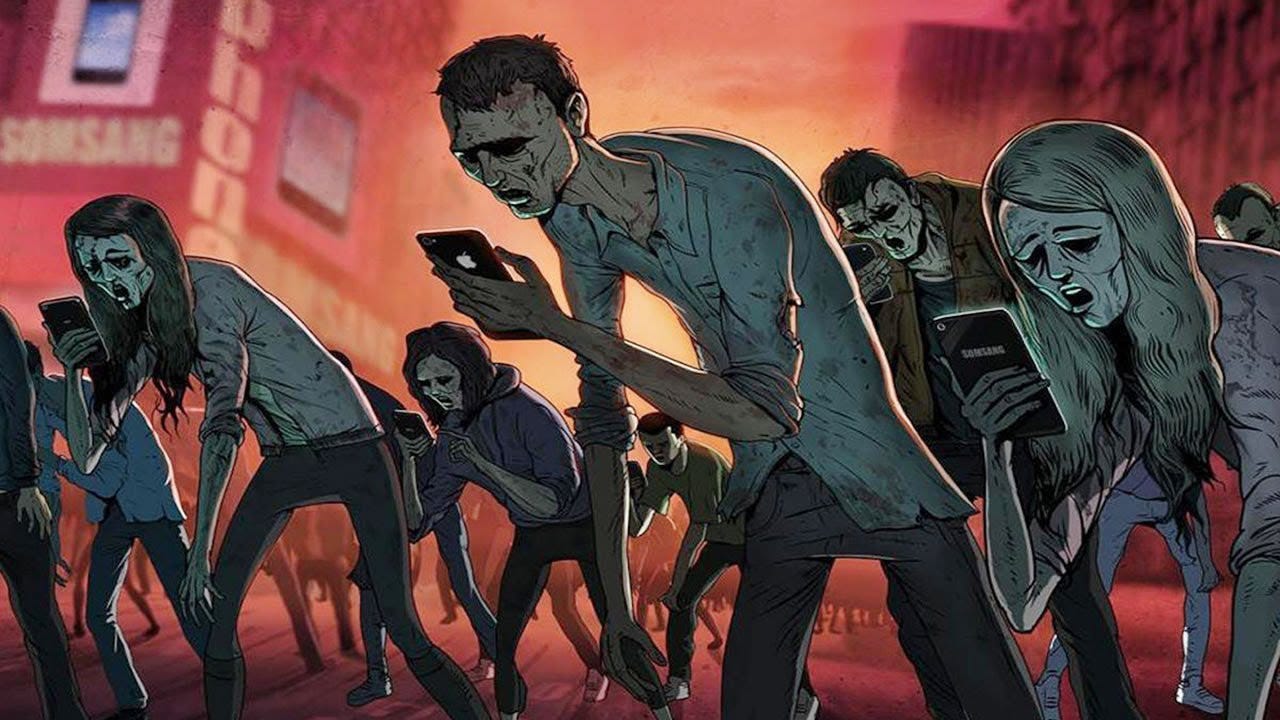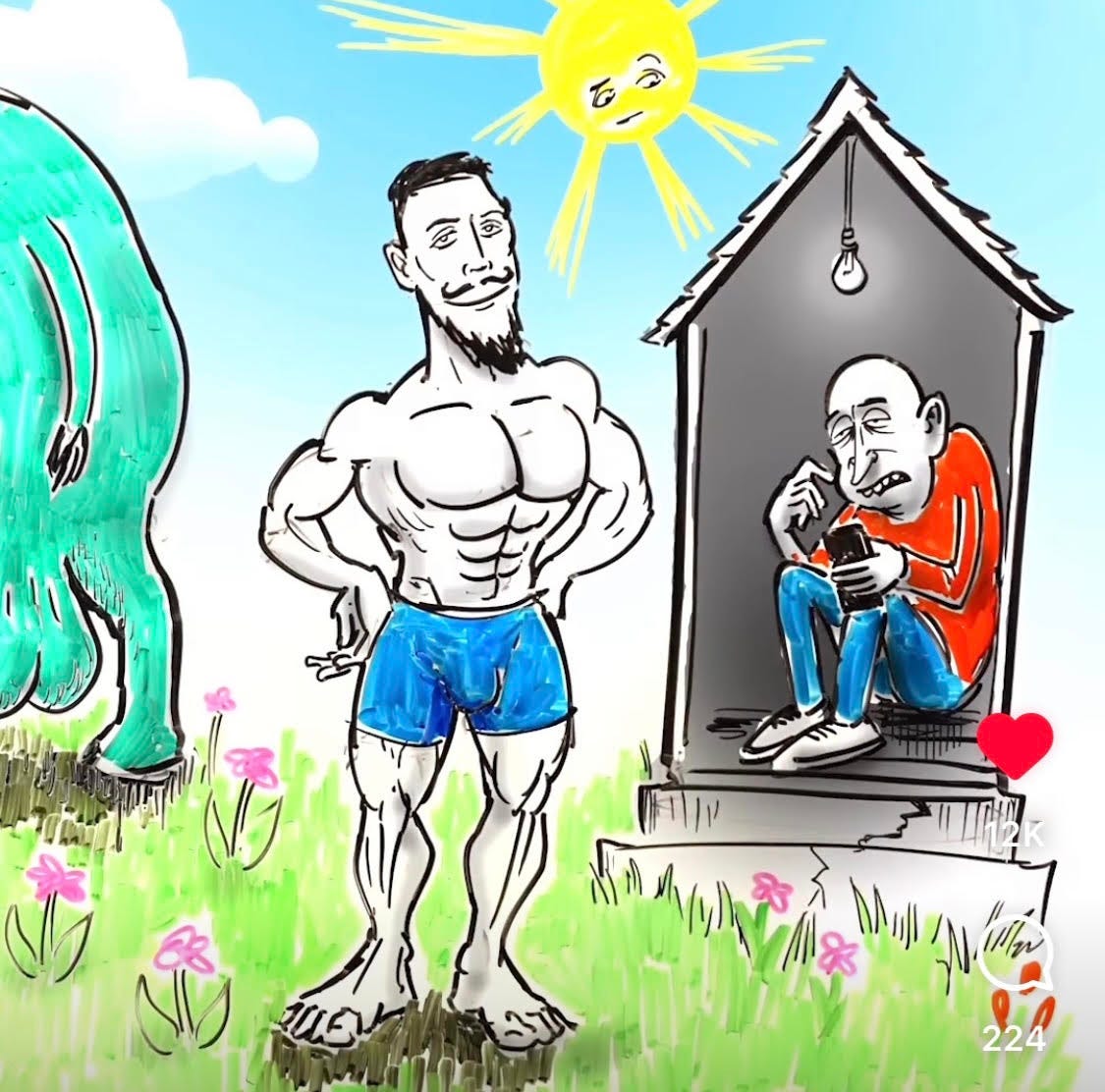Overstimulated Zombies are Destroying Themselves and the World
Three Point Essay #49 | Phone addiction & the decay of mental robustness
Jeff Sullivan’s Three Pointers
I. 2020s
The dystopian future is already here.
One day I was walking around campus in a good mood. Until I went into a dining hall.
Until I saw a mob of overstimulated zombies. Hundreds of people jammed together in line, hundreds of necks in distorted positions, hundreds of humans staring at their phones. No one looking at each other. No one having a conversation. No one doing anything besides assaulting their brain with tsunamis of digital stimuli.
Ah, the 2020s.
Sights like this make me concerned for my fellow young generations. Face-to-face conversations? Physical books? Real sex? The good stuff? Overstimulated zombies don't value these things. All they want to do is get high on information. All they want is screen stimulation.
What’s an explanation for why everyone is so addicted?
Technology experts claim that smartphones are like slot machines. Both work through the power of intermittent variable rewards. “Pulling the lever of a slot machine gives you a highly variable reward, which maximizes neurological addictiveness;” Luke Burgis writes, “your smartphone does the same thing every time you swipe down to refresh your Instagram feed, never knowing when something interesting might show up.”
In 2018, Nielsen reported that the average American spent eleven hours a day engaged with media. Doubtless in 2023 it is more.
The tendency for these technologies to induce a neurological addiction is clear. Additionally, and worse, many people who are too lazy to work on stuff or move their body anyways now have little chance when you factor in screen enslavement.
Becoming more aware of the real dangers of phone addiction is necessary for everyone.
II.
How excess phone use makes you dumber, screws up your mental health, distorts your perception of reality (and even makes you uglier)
Dumber:
More information is not always good. In fact, it can be quite harmful.
The Noise bottle neck is the name of this phenomenon. “Consuming online content makes us feel like we're learning, but 90% of the content is useless junk” writer Gurwinder Bhogal explains, “small talk, clickbait, marketing—which crowds out actual info from our minds. As such, we feel we're getting smarter as we get stupider.”
'Digital dementia' is a term coined by the neuroscientist Manfred Spitzer to describe how the overuse of digital technology can result in a breakdown of cognitive function.
The cognitive function that suffers most is your ability to focus.
Compulsive social media use is known to deplete your capacity for concentration. If you condition your mind to only absorb and focus on bits of information that last ~30 seconds, you’ll struggle to enter into a deep state of work. On anything. It doesn’t matter what you do; you’ll constantly feel the itch to go scroll. Your attention span gets incinerated.
Mental Health Issues:
In the Subtle Art of Not Giving a F***, Mark Manson discusses how “All day, every day, we are flooded with the truly extraordinary. The best of the best. The worst of the worst. The greatest physical feats. The funniest jokes. The most upsetting news. The scariest threats. Nonstop.”
This applies most to Instagram.
Instagram is essentially a highlight reel of your most attractive pictures from your most fun moments.
Seeing others look so happy and beautiful in cool locations all the time makes many people depressed when they compare their timeline to their own life. When scrolling it seems like everyone you follow lives some rock-star life. But its always just what people choose to show. It’s not real.
No one posts the mundane moments of life on IG. Everyone throws up the extraordinary ones. When, in reality, most of life for everyone is ordinary—brushing your teeth, going to the gym, using the bathroom, feeling bored in the middle of the day, etc. But when you’re on the gram, you would never think that.
Reality Distortion:
The virtual world does not sample the real world very well.
The prime example of this is twitter. Spend enough time on Twitter and you’ll be convinced everyone is angry and at each other’s throats 24/7. Many exchanges are negative. It’s always one tribe hurling insults at another.
But then, you walk outside. You walk through school. You walk through downtown. Most of your interactions are positive. People generally get along well. But if you spent all day in your bed on Twitter, you would think it’s not safe enough to even go outside.
Uglier:
Spend enough time twisting your body to stare at your phone, and you’ll end up looking like Gollum from lord of the rings:
III. Nuance
All that said, I love my iPhone. I love social media.
The iPhone is one of the greatest inventions ever. It’s magical. So is social media. It enables millions of people to communicate, connect, and express themselves in meaningful ways.
It’s about using these technologies mindfully. Moderation is the key. Duh, you think, but moderation is extremely difficult. There’s literally people whose jobs are to addict you to these things.
People’s brains are developing in such a way where, if there's no inputs—if there's no stimulation—they panic. No bueno. If you can’t handle any boredom, you’ll become a nervous wreck. You’ll never be calm. And anyways, your best ideas will come to you when you aren't stimulated. When your mind is free to wander. Don’t be scared of boredom.
Overall, it’s about awareness. Successful people have impulse control, discipline, and hyper-awareness over every single one of their actions. Especially when it comes to what they do on their phone.
Fact: everyone's addicted to something. Choose your addictions wisely. You can be addicted to scrolling on screens like the rest of them. Or, you can be addicted to reading books. You can be addicted to working out. There are good addictions.





HOLA CARNAL.SOLID.ORALE